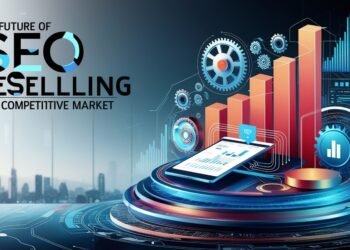Choosing the right ERP (Enterprise Resource Planning) software can feel overwhelming especially with so many options out there. But the good news is, you don’t need to be a tech expert to make the right decision. Whether you run a small business or a growing company, this easy-to-follow guide will help you understand what ERP is, why it matters, and how to choose the best one for your unique needs.
Let’s break it down in simple terms.
What Is ERP Software?
ERP software helps you manage all your core business activities from one place. This includes things like:
- Accounting and finance
- Sales and marketing
- Inventory and supply chain
- Human resources
- Customer relationship management (CRM)
Instead of using separate tools for each department, best ERP software for small businesses connects everything. This makes your business more organized, efficient, and easier to run.
Why Choosing the Right ERP Matters
The right ERP system can help you:
- Save time and reduce manual work
- Get real-time insights about your business
- Improve customer service
- Reduce errors and boost accuracy
- Scale easily as your business grows
On the other hand, choosing the wrong ERP system can lead to wasted money, frustrated staff, and a system that doesn’t actually help.
Key Points to Consider When Choosing ERP Software
Here are the most important things to look at before making your decision:
1. Understand Your Business Needs
Start with a simple question:
What problems are we trying to solve?
List the areas where you face challenges—maybe it’s inventory management, delayed invoicing, or poor communication between departments. Knowing your pain points will help you choose a system that fits.
2. Set a Realistic Budget
ERP systems range from free open-source platforms to expensive enterprise-level software. Be honest about what you can afford—not just for the software itself, but for:
- Installation/setup
- Training your staff
- Maintenance and upgrades
Cheaper is not always better, and expensive doesn’t always mean quality. The right ERP gives you value for your investment.
3. Choose Between Cloud or On-Premise
You have two main types of ERP:
- Cloud ERP: Hosted online. You can access it anywhere with internet. Lower upfront cost.
- On-Premise ERP: Installed on your company’s servers. More control and customization, but higher setup cost.
Most small and mid-sized businesses go with cloud ERP for its flexibility and affordability.
4. Check for User-Friendly Interface
If your team can’t use it easily, they won’t use it at all. Look for ERP software with a simple, clean dashboard and basic navigation.
Tip: Ask for a free trial or demo to see if it’s easy to use.
5. Scalability
Will the ERP grow with you? A good system should handle your needs now and also support your growth for the next few years.
Check if you can add:
- New users
- More modules
- Advanced features (like AI or automation)
6. Integration with Other Tools
Do you already use tools like QuickBooks, Shopify, or Salesforce?
Your ERP should integrate easily with the tools you’re already using. This reduces extra work and improves data accuracy.
7. Customer Support and Training
Even the best ERP will run into issues. Choose a provider that offers:
- 24/7 customer support
- Training materials or onboarding
- Quick response times
Good support makes a huge difference when you’re facing problems or during setup.
8. Security and Compliance
Your ERP software will store sensitive business data. Make sure it has:
- Data encryption
- Regular backups
- Role-based access control
Also, check if the ERP meets local and industry-specific compliance requirements.
📊 Informative Chart: Quick Comparison Guide
| Feature | Cloud ERP | On-Premise ERP |
|---|---|---|
| Cost | Lower upfront | Higher upfront |
| Setup Time | Faster | Slower |
| Access | Anywhere (online) | Limited to office |
| Updates | Automatic | Manual |
| Control | Vendor-managed | Fully customizable |
| Best for | Small to Mid-business | Large enterprises |
Top Questions to Ask ERP Vendors
Before you buy, ask the vendor:
- Can I see a live demo?
- What industries do you serve?
- How long does setup take?
- Do you offer customer support?
- What is your pricing model? (One-time fee, subscription, etc.)
Asking the right questions helps avoid surprises later.
Final Thoughts: Making the Right Choice
Choosing the right ERP software isn’t just about picking the most popular one. It’s about finding the system that fits your business goals, budget, and workflow.
Take your time. Talk to your team. Try out demos. The more you understand what you need, the easier it becomes to find a solution that works.
Remember: a good ERP system should make your life easier, not harder. It should organize your business, improve decision-making, and free up your time so you can focus on what matters most—growing your business.
Once you make the right choice, the impact is powerful: smoother operations, happier employees, and better service for your customers.
Read more blogs: https://lmsvu.com/
FAQs
Q1: How long does it take to implement ERP software?
A: It depends on the system and your business size. For small businesses, it can take a few weeks. For larger setups, it may take several months.
Q2: Can I customize ERP software to my business needs?
A: Yes. Many ERP systems allow customization for workflows, reporting, user roles, and modules.
Q3: Do I need technical knowledge to use ERP software?
A: No. Most modern ERP platforms are designed to be user-friendly. Many offer training and support to help you get started.
Q4: Is ERP only for large businesses?
A: Not at all. There are ERP solutions designed specifically for small and medium-sized businesses with limited budgets.
Q5: What happens if I outgrow my ERP system?
A: Good ERP systems are scalable. You can upgrade plans, add new features, or even migrate to an advanced system if needed.




